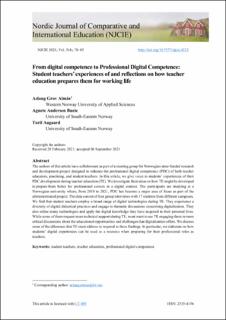From digital competence to Professional Digital Competence: Student teachers’ experiences of and reflections on how teacher education prepares them for working life
Peer reviewed, Journal article
Published version
Permanent lenke
https://hdl.handle.net/11250/2975957Utgivelsesdato
2021Metadata
Vis full innførselSamlinger
- Institutt for pedagogikk [285]
- Institutt for språk og litteratur [150]
- Publikasjoner fra CRIStin [3623]
Originalversjon
Almås, A. G., Bueie, A. A., & Aagaard, T. (2021). From digital competence to Professional Digital Competence: Student teachers’ experiences of and reflections on how teacher education prepares them for working life. Nordic Journal of Comparative and International Education (NJCIE), 5(4), 70-85. https://doi.org/10.7577/njcie.4233Sammendrag
The authors of this article have collaborated as part of a steering group for Norwegian state-funded research and development project designed to enhance the professional digital competence (PDC) of both teacher educators, practising, and student teachers. In this article, we give voice to students’ experiences of their PDC development during teacher education (TE). We investigate their ideas on how TE might be developed to prepare them better for professional careers in a digital context. The participants are studying at a Norwegian university where, from 2018 to 2021, PDC has become a major area of focus as part of the aforementioned project. The data consist of four group interviews with 17 students from different campuses. We find that student teachers employ a broad range of digital technologies during TE. They experience a diversity of digital didactical practices and engage in thematic discussions concerning digitalization. They also utilise many technologies and apply the digital knowledge they have acquired in their personal lives. While some of them request more technical support during TE, most want to see TE engaging them in more critical discussions about the educational opportunities and challenges that digitalization offers. We discuss some of the dilemmas that TE must address to respond to these findings. In particular, we elaborate on how students’ digital experiences can be used as a resource when preparing for their professional roles as teachers.

